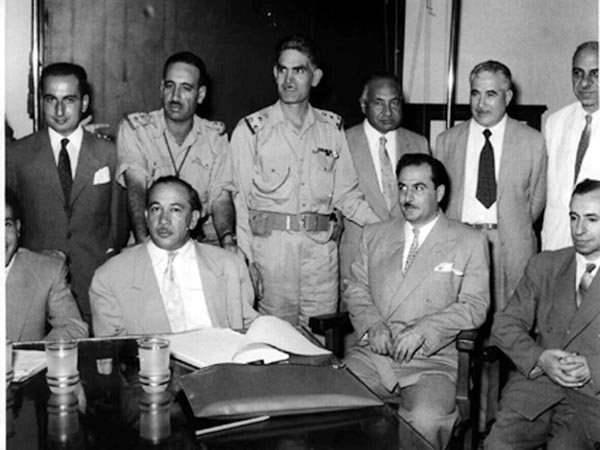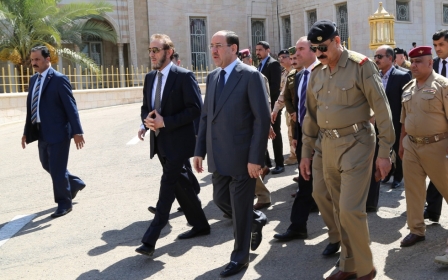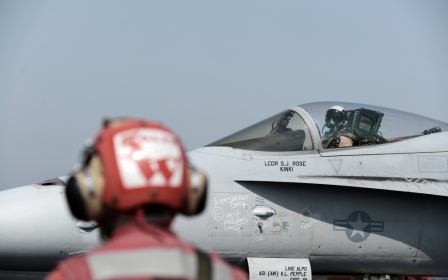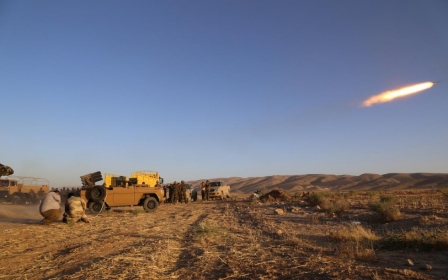Maliki leaves with no guns blazing

Peaceful transitions of power are a rare occurrence in Iraq. Indeed, between Iraq's bloody revolution in July 1958 and now, power has been transferred peacefully only a handful of times - and most of those were guided under the watchful eye of the US military. So when Nuri al-Maliki announced his resignation as Iraq’s prime minister on 14 August, the Iraqi public and international community gave a collective sigh of relief.
On July 14, 1958, an Iraqi general, Abd al-Karim Qasim, instead of following his orders to assist the Jordanian government put down disturbances, ordered his forces to occupy Baghdad, seize control of the radio station, and lay siege to the royal palace and Ministry of Defense. Within 24 hours, Iraq’s royal family was extinct and the Republic of Iraq had been formed.
For the next five years, Qasim ruled Iraq as a military dictatorship. An enigma, Qasim played all of Iraq’s various political factions - Arab nationalists, communists, Kurds, and Ba’thists - off one another, with varying degrees of success. However, his “divide and rule” tactics ultimately backfired. For instance, he alienated the Arab nationalists in 1958-59; turned against the communists in 1960; provoked the Kurdish War in 1961 (which would last until 1975); and was finally overthrown by the Ba’th Party in a coup on February 8, 1963.
The period following the coup was one of the bloodiest in Iraq’s history. Within two weeks, the US embassy reported the Ba’th Party’s militia had rounded up 14,000 people, 10,000 of them believed to be communists. Though claims vary on the exact number of people killed during this period, the general consensus among Iraq experts is that it was between 3,000 and 5,000; many were tortured to death in Baa’thist dungeons, the details of which are too horrific to tell.
However, within nine months the Baa’th Party had imploded. The party had been split into two distinct factions, a military wing led by Ahmed Hassan al-Bakr urging moderation, while Ali Salih al-Sa’di led an extremist, doctrinaire wing, and commanded the party’s vicious militia, the National Guard.
On November 13, 1963, the party’s differences broke into the open over the question of whether Iraq should form a union with Syria, a move al-Sa’di’s faction desired. That day, moderate Ba’thists arrested al-Sa’di and sent him into exile, plunging the country into a crisis. Before long, violence erupted in the street as the National Guard took up arms and tried to seize power. As violence escalated, Iraq’s president, Colonel Abd al-Salem Arif, (who had also played a key role in the 1958 revolution), ordered the military to arrest key members of the Ba’th Party and forcefully disarm the National Guard.
For the next three years, Arif would rule Iraq in a benevolent manner until he was killed unexpectedly in April 1966, when his airplane crashed during a sandstorm. After a brief period of uncertainly, Arif’s genial brother, General Abd ar-Rahman Arif, emerged as Iraq’s president, and would rule for the next two years, until Ahmed Hassan al-Bakr and the Ba’th Party overthrew him in a bloodless coup on July 17, 1968.
For the next 35 years, the Ba’th Party would rule Iraq, but this was not without its own bloody transitions. In July 1979, when al-Bakr considered uniting Iraq and Syria once again, his ambitious, ruthless nephew, Saddam Hussein al-Tikriti, who feared playing second fiddle to Syria’s Hafez al-Assad, deposed his uncle.
A week later, the Saddam regime indicated that it had foiled a plot and convened an emergency session of the Ba’th Party congress. It was here that Muhyi Abd al-Hussein al-Mashhadi, a member of Iraq’s all-powerful Revolutionary Command Council (RCC), confessed to plotting against the regime and identified 68 co-conspirators, who were led out of the hall - all while Saddam sat smoking a cigar and feigning shock and dismay. Afterwards, Saddam convened a special court to try those involved, with as many as 500 senior members of the party executed. From 1979 until the US-led invasion in March 2003 Saddam ruled Iraq with an iron fist.
In the period since Saddam’s overthrow, Iraq has experience an unbroken chain of peaceful transitions of power, thanks largely to America’s considerable involvement in the constitutional process.
In July 2003, the US established the Iraqi Governing Council (IGC), which was broken down by the basis of Iraq’s demographics, with thirteen Shi’as, five Sunnis, five ethnic Kurds, one Turkmen and an Assyrian. The council had a rotating presidency, giving each member a one-month term. The IGC would govern the country until May 2004, when it elected Ayad Allawi as Iraq’s first post-Saddam prime minister in a unanimous vote, though the post was temporary position until a general election could be held.
The Iraqi public went to the polls for the first time in January 2005 and elected a legislative assembly, which was charged with drafting a new constitution. After a period of protracted negotiations - which is typical of post-Saddam Iraqi politics - Ibrahim al-Jaaffari, the leader of the United Iraqi Alliance (UIA), was named the interim prime minister, a post he held until new elections were held after the promulgation of a new constitution. This was the first peaceful transition of authority in Iraq since 1958.
After a new round of elections was held in December 2005, the UIA once again emerged with the most seats. However, during the usual period of protracted negotiations, al-Jaffari fell from grace, and in April 2006 Nuri al-Maliki emerged as the leading candidate for the premiership and he was invited to form a government on May 20. Once again, Iraq experienced a peaceful transition of power, but only under the careful guidance of its American occupier.
However, during the 2010 parliamentary election, Nuri al-Maliki’s State of Law coalition did not fare as well as he had hoped, with Ayad Allawi’s al-Iraqyya Party winning by a two-seat margin. After a 10-month long period of protracted negotiations and skillful maneuvering, Maliki managed to once again secure the premiership, a post that he held until recently.
In the period following America’s unilateral withdrawal from Iraq, Maliki has taken on an increasingly authoritarian bent, targeting rival politicians and alienating Iraq’s sizable Sunni minority. This has been exacerbated in recent years, and is widely viewed as one of the reasons for the popularity of the militant Sunni group, Islamic State.
Since the April 2014 parliamentary elections, Maliki has shown no interest in giving up power. However, as the Sunni insurgency in northern Iraq has escalated, and Maliki’s Shi’ite base of support has withered, a broadly based coalition of Iraqi politicians nominated Haider al-Abadi as prime minster. Given Abasi’s broad base of support, Iraq’s new Kurdish president, Faud Masum, approved his nomination.
Maliki was outraged. On 12 August, he threatened to take legal action to prevent Abasi’s nomination and raised the specter of a military coup, when he deploy Iraq’s security forces to the Green Zone. The United States, Iran and Saudi Arabia all condemned these actions, which only further underscored Maliki’s isolation.
Ultimately, Maliki’s decision to resign as prime minister on Thursday shows that calmer heads have finally prevailed in Iraq. This is significant because, as Iraq’s troubled history has shown that any move to use force to secure power only contributes further to its self-perpetuated cycle of violence.
- Bryan R Gibson recently completed a PhD in International History at the London School of Economics and is the author of Covert Relationship: American Foreign Policy, Intelligence and the Iran-Iraq War, 1980-1988 (Praeger, 2010).
The views expressed in this article belong to the author and do not necessarily reflect the editorial policy of Middle East Eye.
Photo credit: Abd al-Karim Qasim (back row, centre) and other leaders of the 1958 revolution, including Abdul Salam Arif (back row, second from left) and Muhammad Najib ar-Ruba'i (back row, fifth from left). Also included is Ba'athist ideologue Michel Aflaq (front row, first from right). (Wikicommons)
New MEE newsletter: Jerusalem Dispatch
Sign up to get the latest insights and analysis on Israel-Palestine, alongside Turkey Unpacked and other MEE newsletters
Middle East Eye delivers independent and unrivalled coverage and analysis of the Middle East, North Africa and beyond. To learn more about republishing this content and the associated fees, please fill out this form. More about MEE can be found here.





